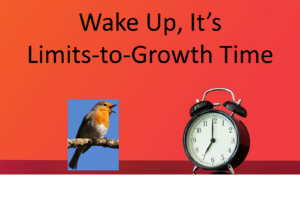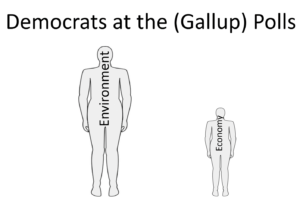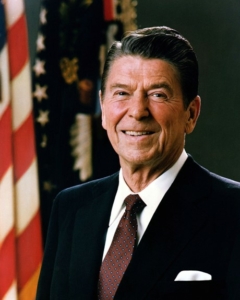Steady-State Talking Points for Democrats and Republicans
by Brian Czech
Limits to growth are all around us. Global heating, resource shortages, and biodiversity collapse are linked at the hip with stagnating productivity, inflation, and crippling debt. Little by little, citizens and politicians are waking up to ecological limits and the economic linkages.
The awakening is painfully slow for those who have long lamented society’s obsession with growth. After all, economic growth entails a growing human population and ecological footprint, exacerbating each of the ecological and economic problems.
While painfully slow, it’s better late than never for an awakening to limits. And, the rate of awakening could very well accelerate rapidly, as when one awakens from a dream. One moment you’re in a state of deep, unconscious sleep, and then, after the slightest intrusion of reality, your senses are transformed. It’s hard to pinpoint the catalyst—maybe the first chirp of a robin or a dim ray of sunlight—but the complexion of the dream is abruptly changed. There’s a fleeting moment of confusion, the dream is gone like yesteryear, and sure enough, you’re dealing with the challenges of the day.

(Robin from Wikimedia, clock from Wallpaperflare)
The population at large—our body politic—may finally be sensing the chirping of the limits-to-growth bird. The dream of unbounded growth may be gone in a flash. The reality of limits to growth may dawn upon us as rapidly as a squared-up sunrise at the equator. We’ll get out of bed and it will be “one small step for man, one giant leap for mankind,” straight back down to Earth. And from that day forth we’ll be looking for political leadership for navigating the limits to growth.
That’s not all bad. When a crash is looming, it’s better to be wide awake than asleep at the wheel. Some braking and steering is still in play.
And for politicians and pundits, plenty of opportunities await in a political landscape transformed by limits to growth. Who will step up to the plate first, Democrats or Republicans? Let’s consider a few potential talking points for each camp.
Democrats
Let’s start with Democrats, who have long been more concerned about the environment than Republicans. That’s especially the case today with global heating. Given the tight linkage of global heating to GDP growth, Democrats ought to be an early riser in the limits-to-growth household.
And, like that first sign of waking up, Dems are explicitly prioritizing the environment over the economy. They’re catching on to the fact that the environment and the economy are closely linked, with economic growth causing environmental problems. And crucially, they’re taking sides: environment over economy.
The taking of sides by the Democratic rank-and-file is itself another kind of wake-up call: a political wake-up call to Democratic politicians. It’s a wake-up call that they, too—Democratic politicians right now, today—would do well to explicitly prioritize the environment over the economy. Doing so will resonate with their base, at least in primary races, and quite possibly in general elections.
It shouldn’t be that difficult to tactfully prioritize the environment, with leadership on limits to growth. The presidential or gubernatorial candidate can say, for example, “Like our Republican friends, we care about the economy, but we care about the environment even more, because it’s first things first. Without a clean, productive environment, we’re not going to have a healthy economy. So let’s make sure we are protecting the environment from too much economic activity, so our kids can have a healthy economy, too.”
If that doesn’t resonate with the voting sense of Democrats, then why bother with Gallup polls? But no; the polls are obviously meaningful. It’s up to the Democratic politician to start capitalizing on the rank-and-file’s stated preference for the environment over the economy.

The skillful Democratic politician will convert Gallup results to electoral wins. (Publicdomaininvectors)
It’s true that the Democratic Party leadership has some inertia to overcome. They committed an unforced error throughout the Clinton years that’s been reflected on the scoreboard ever since. I’m referring to the win-win rhetoric that “there is no conflict between growing the economy and protecting the environment,” which flowed so freely from the mouths of Bill and Hillary, and shockingly even from vice president Al Gore.
The Clintonian rhetoric is what lulled many Americans asleep to begin with. It was a deceptive lullaby that led to the fuzzy dream of “green growth.” Yet Democratic politicians can atone for their sleepy Clintonian past by retooling an old motto.
“It’s the economy, stupid” worked well in the days when the environment wasn’t unravelling at breakneck speed. It worked especially well for a ticket espousing the win-win rhetoric. Surely it won’t work so well as Democratic voters more explicitly prioritize the environment over the economy.
Democratic politicians can tactfully and stylishly remove themselves from the dreamy green-growth past with “It’s the economy, friends.” Protecting our environment is all about managing the economy wisely. We have to be concerned with more than just growing the GDP at this point in history. This re-tooled watchphrase should be carefully placed in the context of environmental discussion. It reinforces for voters that chirping in the ears, beckoning them to come fully awake to limits.
Imagine a primary debate where Lester Holt asks, “What’s your plan for tackling these huge environmental problems like climate change and biodiversity collapse?” The Democratic candidate can safely reply:
You know, Lester, frankly it’s kind of about the economy. Listen, Democrats are waking up to the fact that we live on a finite planet, and we’re bumping up against the limits left and right. Scientists and economists have been trying to warn us about this for over a half century now. It’s no use denying it any more; we see it all around us. GDP growth was a great goal, a smart goal—in the 20th century. But now that we’re well into the 21st century, it’s time to start prioritizing sustainability, especially for our kids and grandkids. So when it comes to protecting the environment? It’s the economy, friends! We have to be concerned with more than just growing the GDP at this point in history. Lester, in Europe they’re starting to talk about degrowth. I don’t know about that just yet, but we should at least be thinking about stability, or a steady state economy.
Such a reply will clearly resonate with Democrats, and probably with a lot of Republicans, too, or at least the true conservatives among them.
Republicans
Republicans proudly carry the label “conservative,” the root of which is “conserve.” It therefore belies the party when its leaders so recklessly rail against environmental regulations and push for the privatization of public lands. And, it puts party leaders out of touch with rank-and-file Republicans becoming concerned about climate change (younger Republicans especially) and the conservation of their hunting and fishing grounds.
Indeed, a case can be made that steady statesmanship—pursuit of the steady state economy—is a natural fit for conservatives. It’s not all about the environment, either. What about fiscal conservatism? Working our way out of debt and striving for a non-growing government not only speaks to the Republican base; it’s as steady-state as you can get.
The steady-state Republican leader has only to add one little detail to the mix: What’s good for the public goose is good for the private gander. Stabilizing the size of government means stabilizing the size of the governed.
The private sector needs government for crucial goods and services that the free-market invisible hand won’t be providing: education, financial regulation, law enforcement, transportation infrastructure, public transportation, and national defense among other things (including environmental protection). It’s common sense that the need is in proportion to the size of the population and economy. More students need more schools, more banks need more regulation, more trucks need more roads, etc.
In fact, as limits to growth are met and breached, the proportion of government to private sector activity should be expected to increase. Why? Because things like crowding, competition and complexity increase at the limits to growth, calling for more engineering, regulating, and policing. Keep in mind that these government functions must increase while GDP growth is stagnating (by definition, at the limits to growth). So of course the proportion of government spending to GDP will increase, as indeed it has (with and without the covid spike).
So, in response to Sean Hannity inquiring, “How would you address the proliferation of Big Government?”, the savvy, steady-state Republican would reply:
I’m glad you asked that, Sean, because we tend to overlook the fact that a big economy actually needs a big government. Government done right is as good for the economy as grease on an axle. But you know what? We’re well into the 21st century now, and we just have to realize that we can’t have more and more of everything, forever. It’s getting more important to have a smoothly running economy, with just the right amount of government grease, than it is to have a constantly growing GDP. We should care more about the quality of life than the quantity of goods and services.
Hannity’s jaw might drop, but how better to put oneself ahead of the pack?
Republicans already fight tooth and nail for a debt ceiling. In the midst of the latest debt-limit crisis, Gary Gardner asked, “What about the other debt ceiling?,” referring to the ecological debt as calculated by the Global Footprint Network. What we all need to keep in mind is that the ecological debt ceiling is the fiscal (and GDP) debt ceiling, because spending real money entails an ecological footprint.

“America is too great for small dreams,” Ronald Reagan said. In retrospect, perpetual GDP growth was a small dream. (Pixabay)
Fiscal conservatives, then, are like poets not knowing it. They’re steady staters, but focused on just one side of the coin. As the younger Republicans, especially, are waking up to global heating and its clear connection to GDP growth, they’ll be seeing the other side of the coin soon. Then it will dawn upon them that, at the limits to growth, fiscal conservatism is the steady state economy.
I’ll end this segment with an irony. Few Republicans were more pro-growth than Ronald Reagan, who famously opined, “There are no great limits to growth because there are no limits of human intelligence, imagination, and wonder.” Yet I prefer another Reagan quote, “America is too great for small dreams.” Now that’s a quote that fits the present context. It’s time to awaken from the antiquated, materialistic dream of perpetual GDP growth. It was too small a dream for a great America.
Brian Czech is CASSE’s Executive Director.






A gallop poll from March 2023 shows 49% Independent, 25% Dem and 25% Republican. If Brian had found any Dem or any Republican referring to limits to growth, he would have quoted that politician. One thing not growing in the USA is the membership in either of the parties that claim to own the political debate. In 2015 Bernie Sanders declared to CNN: “You can’t just continue growth for the sake of growth in a world which we are struggling with climate change and all kinds of environmental problems” (CNN interview 26 May 2015). But Bernie ran as a Dem & thus adopted green growth instead. If this were a betting proposition, I would wager that limits-to-growth arguments will most likely come from Independents. Imagine a political debate in which the Limits to Growth Party (LGP) fielded a candidate. Suddenly the Dems and Republicans would find common ground, in order prohibit the LGP candidate from participating in the debate.
A stable planet benefits all, regardless of political persuasion we all need a survivable environment. This message is slowly and surely permeating the social conscious, keep up the ongoing messaging. The article reminds me of an old Michael Jordan quote, ‘Republucans buy sneakers too’ said to avoid taking sides with many seeing his reluctance to put principles ahead of profits. Its not Air Jordans now, its just the air. ‘Republicans breathe fresh air too.’